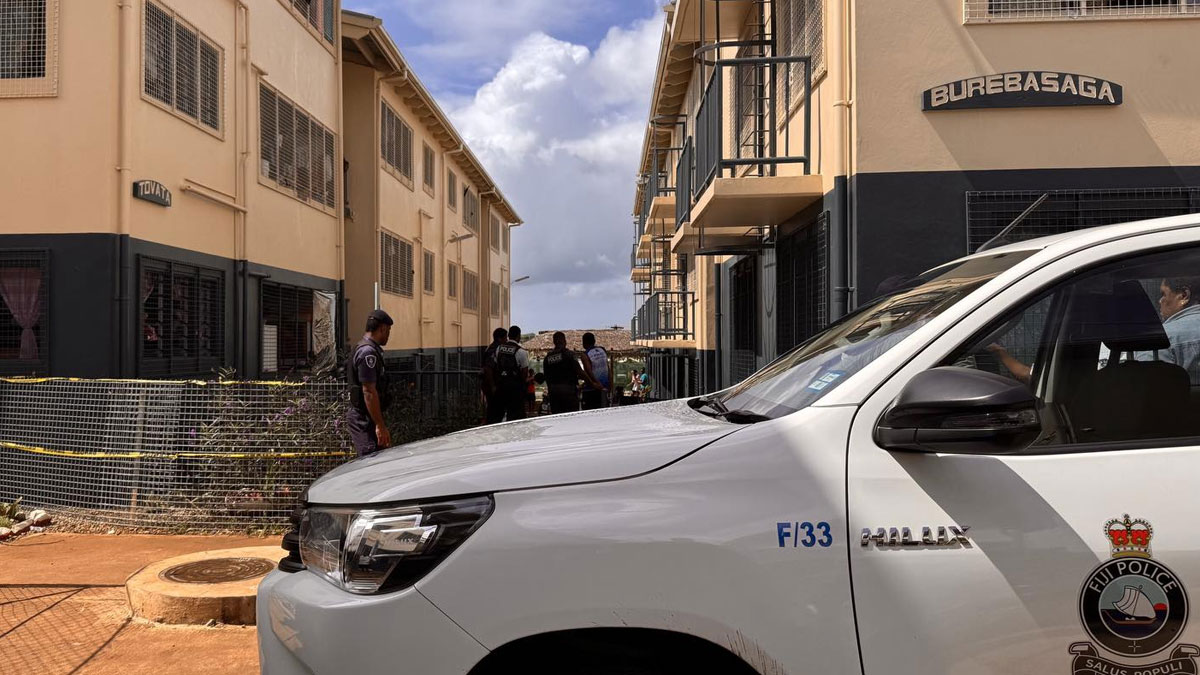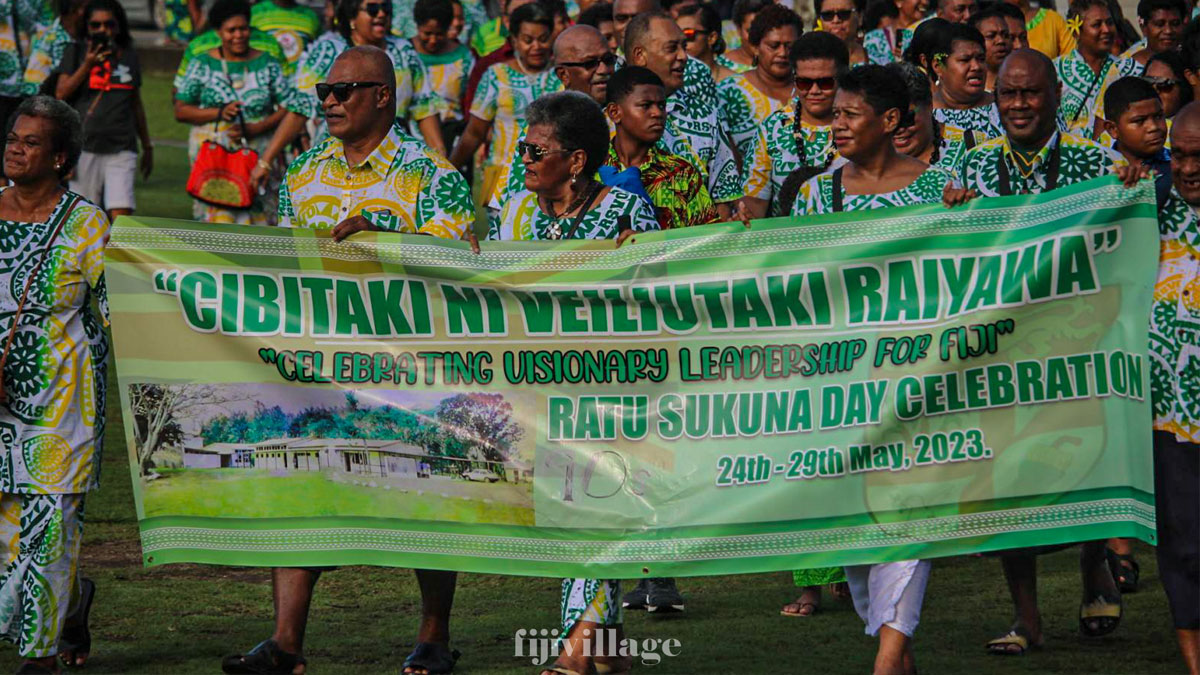
People turned out in numbers to be part of the Ratu Sukuna Day celebrations, which began with a march from the Flea Market to Albert Park.
Students from Queen Victoria School, Ratu Kadavulevu School, Marist Brothers High School, and Adi Cakobau School were part of the march as well.
Members of the disciplined forces including the Royal Fiji Military Force, Police, Fire, and Prison Wardens also took part.
Government departments were led by the Ministry of iTaukei Affairs.
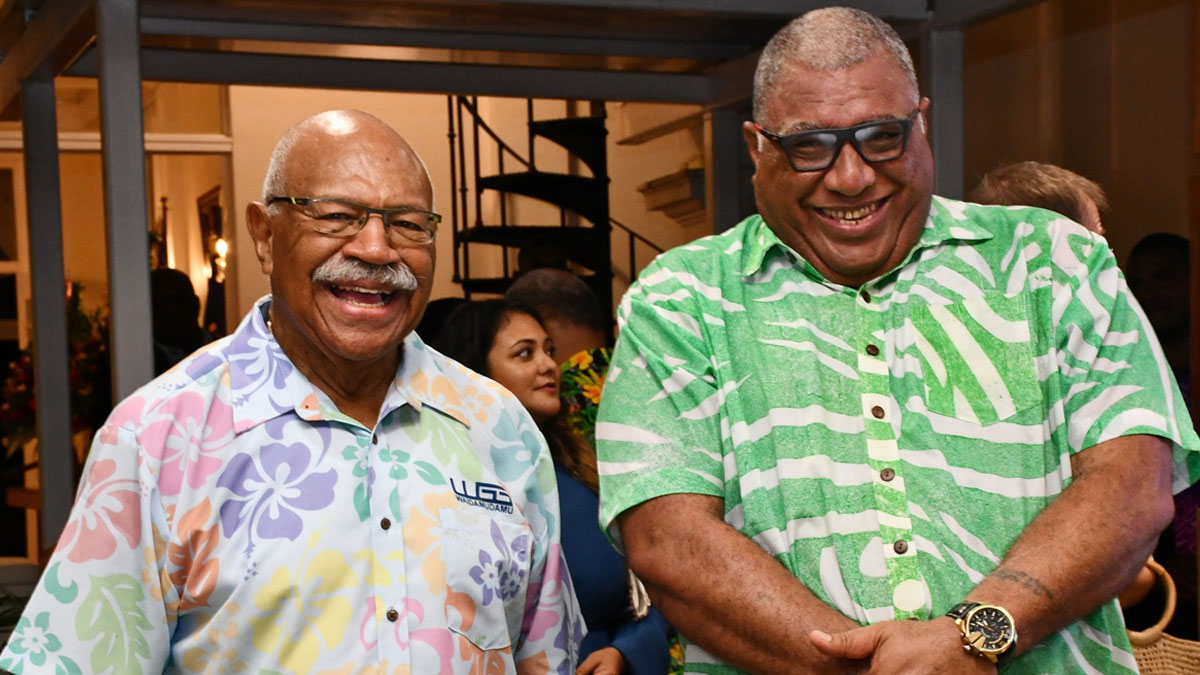
President Ratu Wiliame Katonivere hosted a reception at the State House for cabinet ministers, members of the diplomatic corp, civil society members, and other invited guests to conclude the week-long celebrations of Ratu Sukuna day.
Prime Minister Sitiveni Rabuka and his wife Suliueti Rabuka were also present at the reception.
The joint RFMF and Naval Band provided the music while the guards performed precision marching drills and celebratory gunfire, beating of the retreat which concluded with the lowering of the national flag.

Various provinces have raised concerns during the Great Council of Chiefs consultations regarding the participation of youth and women in the GCC meetings.
This has been highlighted by the Permanent Secretary for iTaukei Affairs Pita Tagicakirewa.
Tagicakirewa says this was raised during the GCC consultations that was done around the country.
He says according to the Minister for iTaukei Affairs, the special sitting will be held in the next six months to discuss the GCC review report.
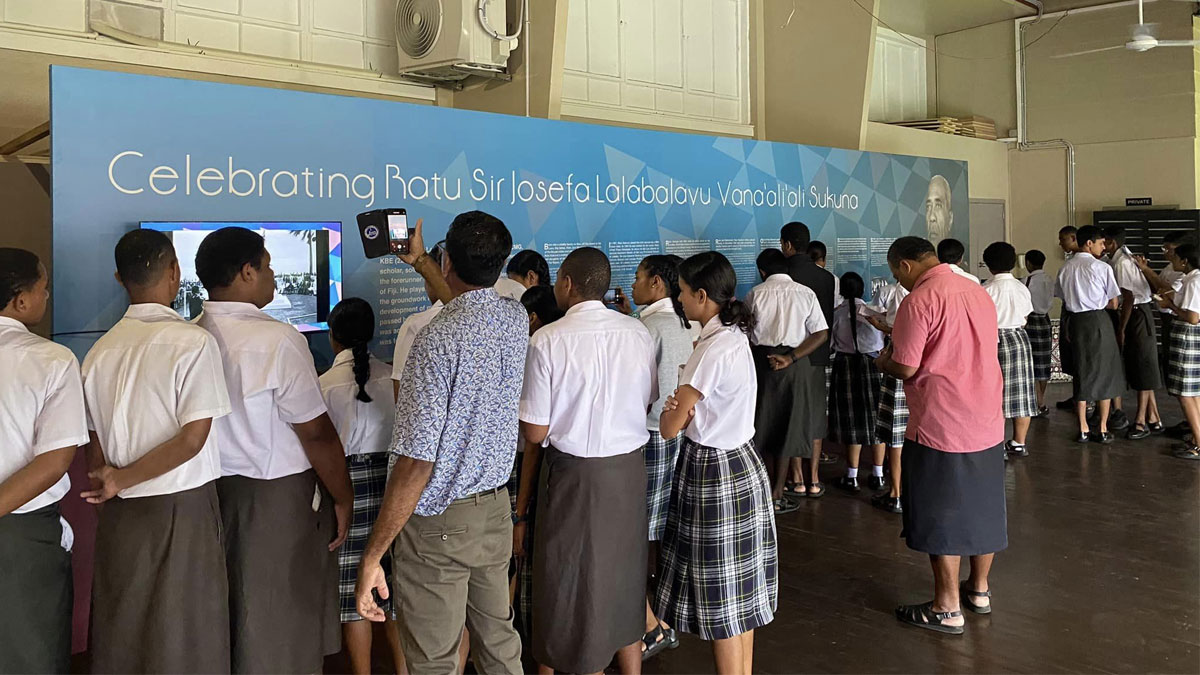
There were long lines of people outside the Fiji Museum waiting for their chance to be able to see the displays.
Vinti Chandra from Nadi says she last visited the museum in 2015 and was encouraged by her friends to visit the museum as it has changed after the renovation.
Chandra also says it was a perfect day to visit the museum and look at their ancestral history.
Kelemedi Gukirewa who is a University of the South Pacific student, says there are a lot of changes from the last time he visited.
Gukirewa says it is great to celebrate Ratu Sir Lala Sukuna after 16 years and the display shows how much great history is linked to Fiji.
He adds that the younger generation should not forget their roots as it tells us so much about our country and people.
Evelyn Ali says the renovation has made a good impact and the museum is much more organized than before and she got to see new things.
Ali says Ratu Sukuna plays a huge part of our history and she hopes to see displays related to him as he is one the finest statesmen of Fiji.
She encourages others to visit the museum as it would be great to know what our history was about.
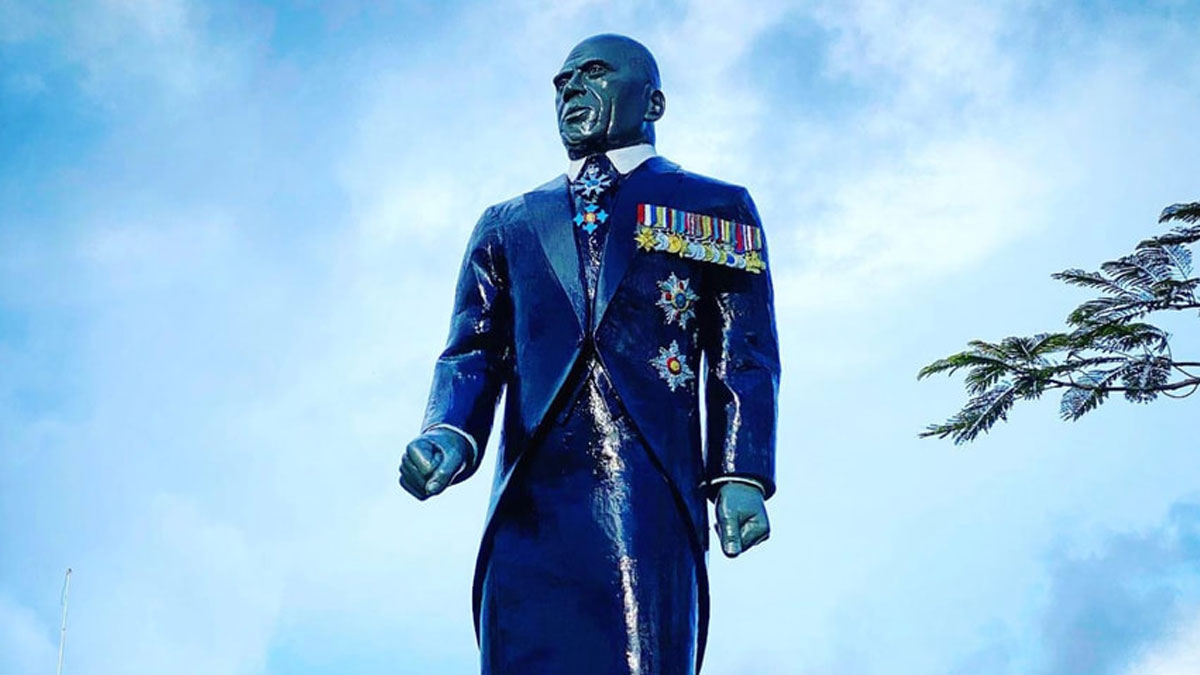
He was known as a man of two worlds, as a prominent chief and as the first among equals of the Fijian cadre in the British administration.
President Ratu Wiliame Katonivere stated this about Fiji’s greatest statesman Ratu Sir Josefa Lalabalavu Vanayaliyali Sukuna in his address during the Ratu Sukuna Day celebration at Albert Park.
He says Ratu Sukuna was a scholar qualified in Arts and Law who used his legal expertise to safeguard and further develop framework for the management of native Fijian land for the benefit of all Fijians.
The President also says to fully appreciate the enormity of the work that Ratu Sir Lala Sukuna had to undertake, we need to change the relevant apparatus of government, particularly on our education system.
He further says for our traditional institutions to be embedded and teach Ratu Sukuna’s legacy, we need to learn from Ratu Sukuna’s life to help chart our nations course.
Ratu Wiliame adds a life of safeguarding the iTaukei land, sea, natural resources, economy, education and culture.
He also adds a life fostering peaceful living with other races and availing iTaukei land for the country’s economic development.
He also adds appreciating the work undertaken by the late chief we must understand how exceptional his role was that his 3 legged stool concept should be the right modality for our country.
Ratu Wiliame further adds we must also acknowledge that the legs are uneven and we must lift each other up when we are needed in our societies, in our decision as a nation.
The President Further adds Fiji is now at a crossroad.
He says Ratu Sukuna recognised early on that Fiji was a multi racial country and must draw on the richness of our diversity and strengthen the foundation of the Fiji that we want.
Ratu Wiliame also says since the 1930’s Fiji has undergone extensive transformation.
He further says the social changes have increased demand on our resources, as they call on our collective attention as we strive to remain productive,
The President adds as a thriving nation and economy we are faced with newer threats the unprecedented external shocks as well as the overhanging reality of climate change.
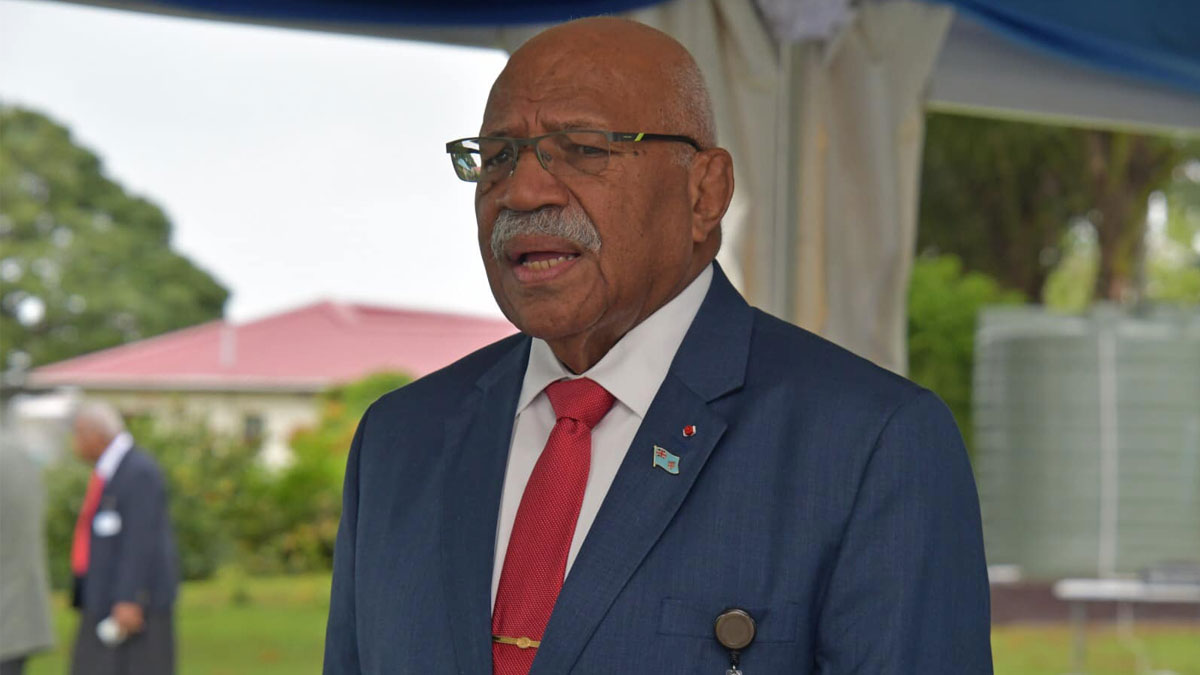
This month has seen three key decisions take effect, for the first time an annual holiday to honour the early Girmitiyas, the Great Council of Chiefs was reborn and the revival of the annual celebration to mark the life and achievements of Ratu Sir Lala Sukuna.
Prime Minister Sitiveni Rabuka highlighted this adding many things in our country had to be changed, corrected and restored after 16 years of authoritarian rule and decision-making by the last government.
Rabuka says they have started to address and implement a large number of these since the People’s Coalition government came to office in late December.
He also says in Ratu Sukuna’s case his inherent intelligence and abilities came with all the mana and authority of those born into the ranks of chiefly leadership. The Prime Minister further says through his patient application of chiefly persuasion, the indigenous people agreed to relinquish control of their land to a special board set up by the government.
He adds the Girmitiya descendants had provided a “striking demonstration” of what individual effort in agriculture could achieve in the face of many obstacles.
Rabuka adds the Indian community was undoubtedly a great economic asset to the colony and their aspirations and interests were of vast importance to all.
He further adds Ratu Sukuna then began what was to become a mighty effort to achieve community-wide agreement on a critical national issue.
The Prime Minister says the high chief embarked on a campaign to visit all the Fijian provinces, convening meetings in village after village about surrendering control of their land to a new board to be formed by the government.
He also says it would take responsibility, on their behalf, for leasing and managing the land.
Rabuka further says in 1940 the Legislative Council approved the Native Land Trust Board Act for dealing with native land was to be vested in the new Native Land Trust Board (NLTB).
He adds that Governor Sir Phillip Mitchell hailed the decision of the indigenous people to give up direct control of their land as “one of the greatest acts of faith and trust in colonial history”.
The Prime Minister adds Ratu Sukuna spoke of unmatched acts of goodwill and cooperation.
He says Fiji’s progress into one of the most economically-developed countries among the Pacific Islands is underpinned by what Ratu Sukuna put in place all those years ago.
The NLTB (now iTaukei Land Trust Board) is presently going through a process of reform and improvement.
The objective is to further lift its efficiency, especially in services to landowners, tenants and investors.
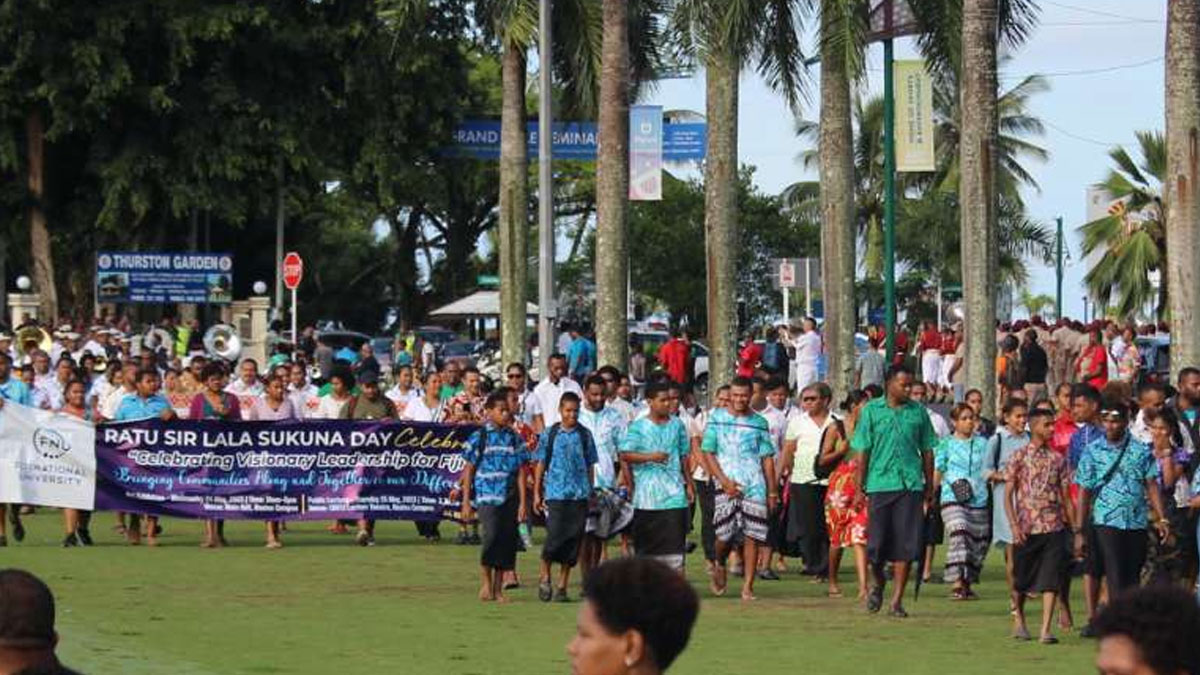
People turned out in numbers to be part of the Ratu Sukuna Day celebrations today which began with a march from the Flea Market to Albert Park.
Students from Queen Victoria School, Ratu Kadavulevu School, Marist Brothers High School and Adi Cakobau School were part of the march as well.
Members of the disciplined forces including the Royal Fiji Military Force, Police, Fire and Prison Wardens also took part.
Government departments were led by the Ministry of iTaukei Affairs.
The Ratu Sukuna Display and a Gallery of Ratu Sukuna’s Medals will be shown at midday.
There were traditional mekes from the villagers of Naqali, Nasautoka as well as from the other ethnic groups from Melanesia who now call Fiji home.
Today is also the last day of the Ratu Sukuna exhibition at Albert Park.
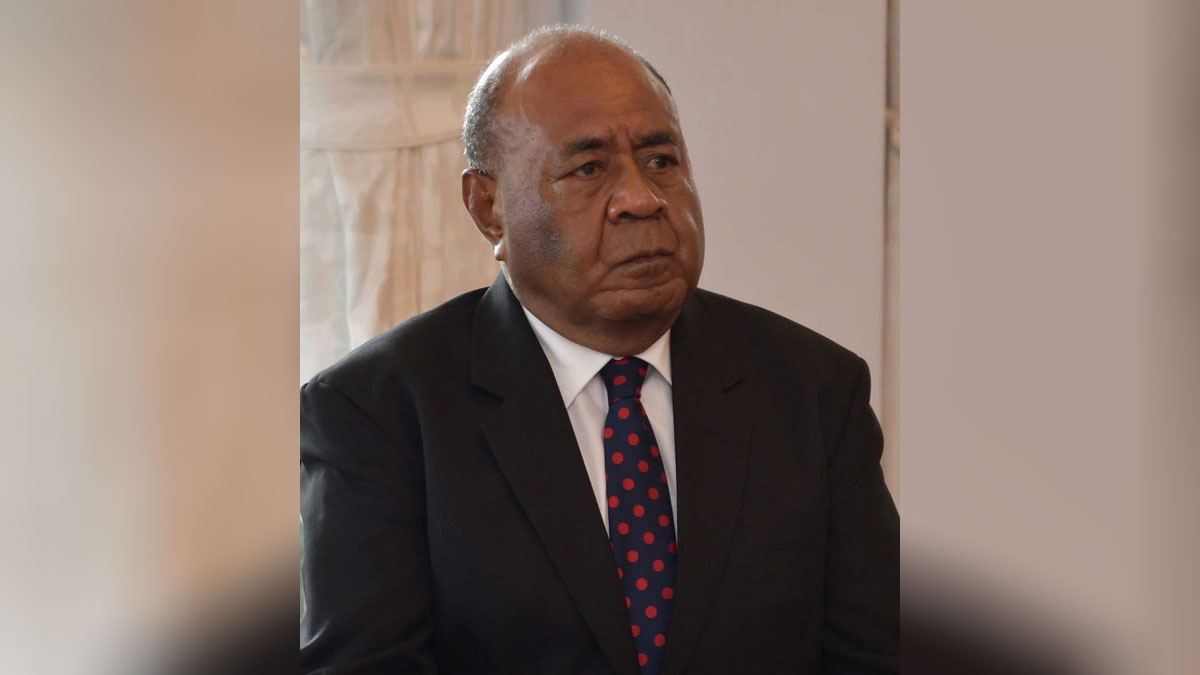
Justice Alipate Qetaki says any consultation undertaken on reviewing iTaukei laws should also include the tenants on iTaukei land and this is one way to honour Ratu Sir Lala Sukuna.
While speaking during a symposium on Ratu Sir Lala Sukuna at the University of Fiji, Justice Qetaki says perhaps one of the new roles of the Great Council of Chiefs is to look at the State Land Act, iTaukei Lands Act, the iTaukei Land Trust Act and the iTaukei Affairs Act as they have been there since the 1940s so it is well past review time.
The former University of Fiji lecturer says we can honour Ratu Sukuna by looking at our laws especially in light of looking at areas the iTaukei is disadvantaged; whether through their own doing or through institutionalized laws.
He says he believes that iTLTB reforms should be held with widest consultation with the tenant community.
Justice Qetaki says the tenant community has also changed and it is not just the Indo-Fijian community but it also includes people coming from Lau, Kadavu and from Vanua Levu to Viti Levu.
He says any law that will target the resource owners should have the widest consultation as the tenants are stakeholders too.
Justice Qetaki adds Ratu Sukuna rationalised land should be leased as it has value to not only the colonial government at that time and bring in income but it will also give security to the farmer who has just been dispossessed and completed his term of agreement with the Fiji Sugar Corporation and also be a source of income to the iTaukei for education and development.
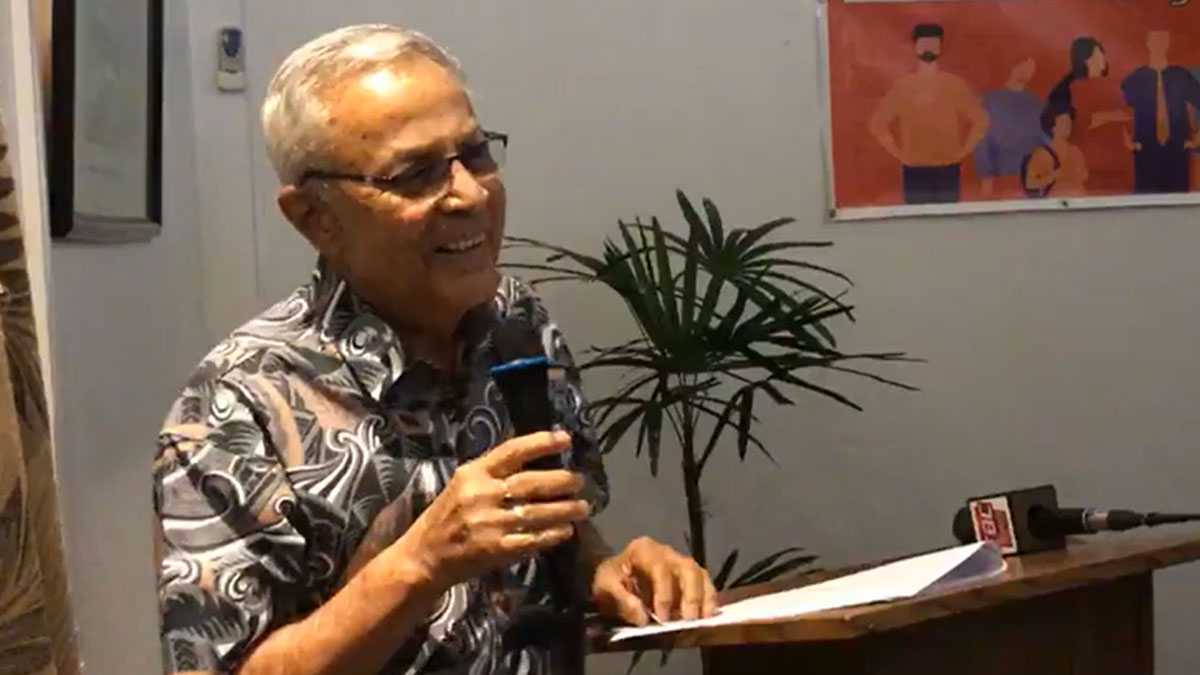
Ratu Sir Lalabalavu Sukuna was a statesman, scholar, soldier, administrator and a distinguished leader who always displayed rationale.
This was highlighted by Fiji Labour Party Leader Mahendra Chaudhry while paying tribute to Ratu Sir Lalabalavu Sukuna.
He says Ratu Sukuna was a skillful administrator and an eloquent speaker remembered for at least three landmark policies or legislation enacted during his tenure in public service.
Chaudhry says Ratu Sukuna was the first iTaukei law graduate, first secretary for Fijian Affairs and first local to be appointed as the Speaker of the Legislative Council by the British Colonial government who fought with the French Foreign Legion in the First World War after being denied admission in the British army.
The former Prime Minister adds Ratu Sukuna is believed to be the main proponent of the Native Lands Ordinance in 1940 which resulted in the establishment of the Native Lands Trust Board, the legislation entrusted the administration of all native lands to the NLTB ( now TLTB).
He says Ratu Sukuna also played a significant role in the re-organisation of the Fijian administration with the setting up of the Fijian Affairs Board in 1946 in which he had worked closely with Governor Sir Philip Mitchell and served as the first secretary to the Board.
Chaudhry says he is renowned for his policy on “the three legged stool” believing that the Vanua, the Church and the government must work together to ensure the well-being of the indigenous people as well as the nation.
He says Ratu Sukuna desired and preached peaceful co-existence and was mindful of the fact that it was the only way to the orderly development of Fiji.
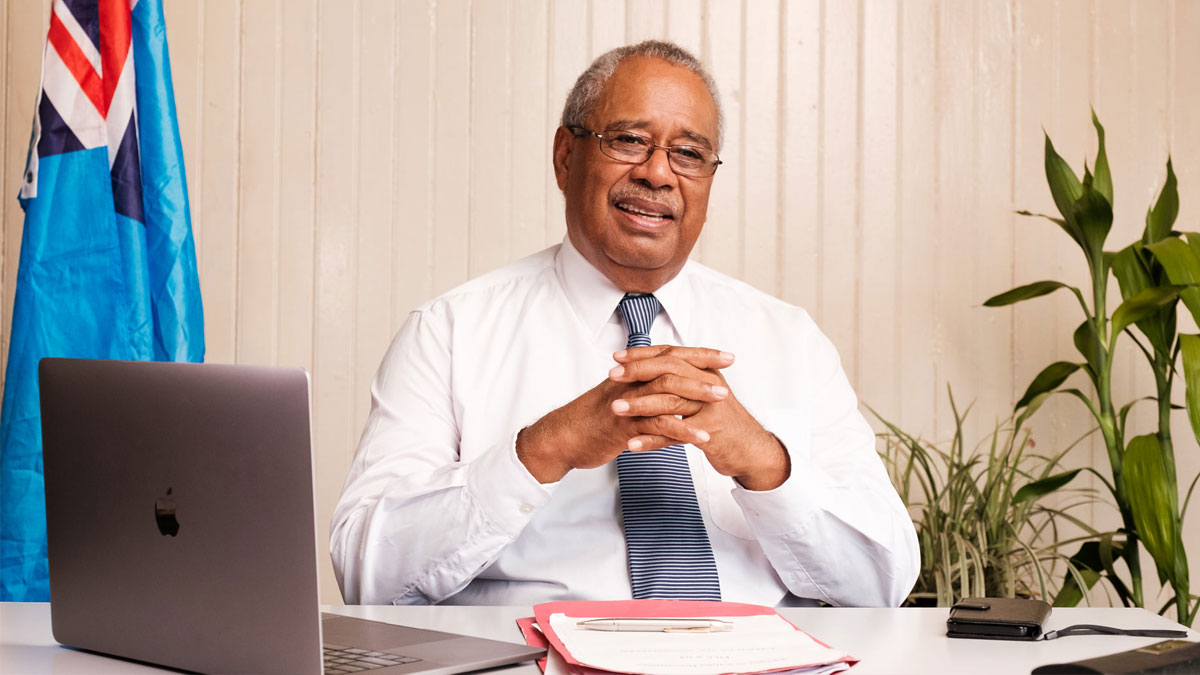
Unity Fiji Party leader and former Reserve Bank of Fiji Governor Savenaca Narube says he is sad to note that we have not realized the economic vision in Fiji and have not turned land ownership into prosperity.
While speaking during a symposium on Ratu Sir Lala Sukuna at the University of Fiji, Narube says resource ownership in Fiji is a political football at times.
He says Ratu Sukuna through the land tenure system that he established and the trust he had to protect the ownership of the land, we have to ask if it has given us the prosperity that he envisaged at that time.
He says we have social problems that is a result of economic problems.
Narube says we are led by chiefs in the community and chiefs are expected to lead not only in political issues but more so in economical issues.
He asks do they have the capacity to do that and adds they need to be realistic in answering that question.
Narube says his view is that the role of chiefs should be in the leadership that leads to the economic prosperity of their people.
He says chiefs should lead the change in mindsets and if that does not happen then he is afraid that the vision of Ratu Sukuna will be difficult to achieve.
Narube adds they should champion change to stay relevant for the modern needs of the people now.
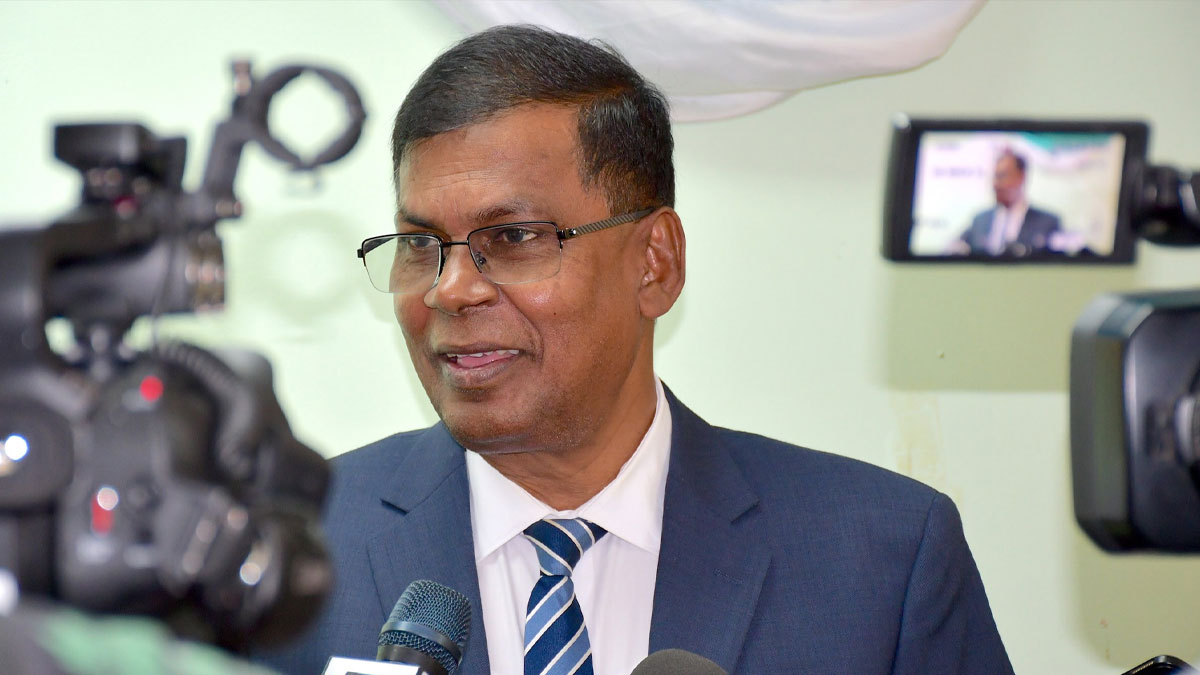
Ratu Sukuna, even as a decorated and hailed French Foreign legionnaire and traditional chief of high rank would not have dared to even think about imposing his view on others.
This has been highlighted by Deputy Prime Minister and Minister for Finance, Professor Biman Prasad while speaking during the Leadership Conference which is part of Ratu Sukuna Day celebrations.
He says as the Great Council of Chiefs Review team do their careful work, he is asking people to help them and put their energy towards this mammoth task.
Professor Prasad says for example, the iTaukei governance structure has been carried on the shoulders of iTaukei men aged 21-60 from every province with an annual levy for a very long time.
He says that was set out in the iTaukei Affairs Act 1944 Regulations.
Professor Prasad says that levy or "provincial rate" is almost like an additional tax that targets only able-bodied and productive iTaukei males.
The Deputy Prime Minister asks that in this current era of human rights and gender equity - is this fair and right.
He is asking people to let their thoughts be known to the GCC Review team.
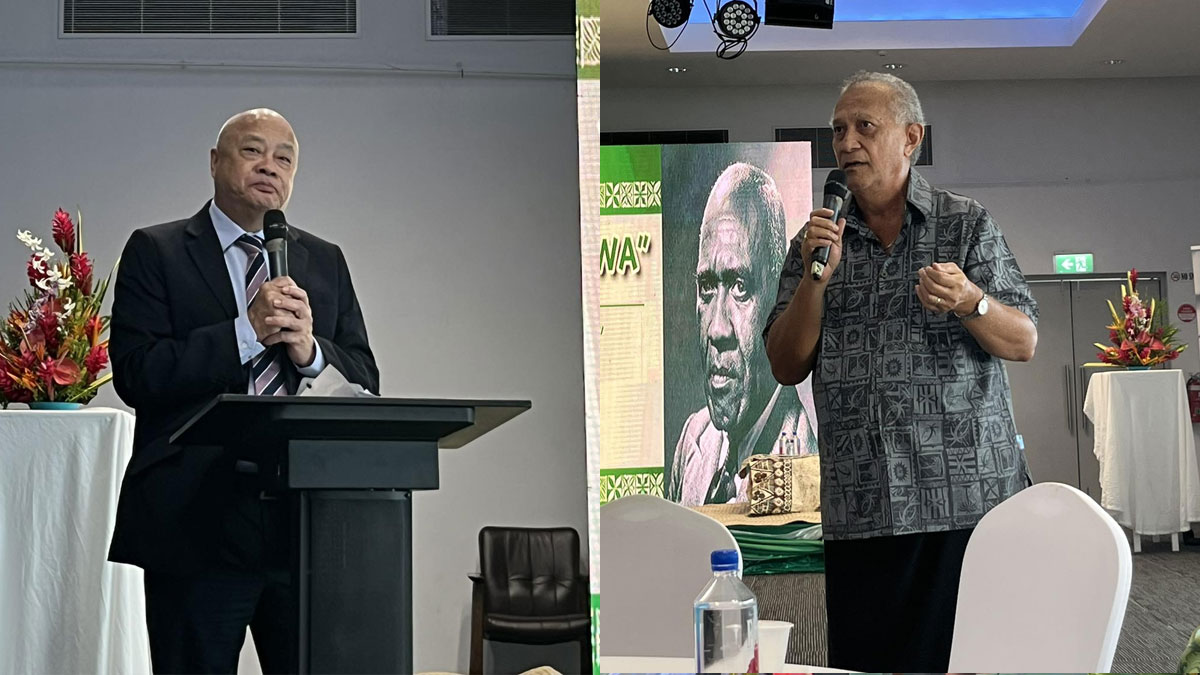
The fallout from the sacking of Chief Justice Fatiaki is still being felt today.
Former President of the Fiji Law Society Graham Leung highlighted this at the Visionary Leadership Conference held at the Harbour Point Convention Centre in Lami as part of the Ratu Sukuna Day celebrations.
Leung also lamented that the systematic undermining of the leadership of then Chief Justice Daniel Fatiaki led to his forcible removal by an army officer in January 2007.
He said that before the then Chief Justice's removal, the judiciary had become divided and dysfunctional.
He added that the judiciary being one of the three arms of government had an important role to play in interpreting the law.
The former president of the Fiji Law Society says an independent judiciary is vital to maintain public and investor confidence.
While responding to Leung’s remarks, former Chief Justice Daniel Faitaki told the packed conference that over the last sixteen years, the law had been ‘weaponised’ and the rule of law had weakened as a result.
Fatiaki says the law had been applied unequally.
He says the law was the last bastion which protected people's rights, and that the normal remedies for redress open to individuals to challenge government decisions had been denied.

Deputy Prime Minister and Minister for Ministry of Trade, Cooperatives, Small and Medium Enterprises and Communications Manoa Kamikamica says the return of the Great Council of Chiefs means another key part of the rebuilding Fiji process.
Kamikamica says the reconvening of the GCC meeting on the chiefly island of Bau, is one of several promises that the three political parties that make up the people’s coalition government planned to deliver should they be elected to lead.
He says one of the satisfying parts of the job of a politician is keeping your promises adding the GCC was a core promise and to see it come to fruition was satisfying.
Kamikamica further says the hope is that the GCC will continue where it stopped but to ensure its relevance in the 21st century.
He adds it should be a source of wisdom, compassion and love for all people in Fiji and more particularly the i-Taukei.
Kamikamica also says the GCC could provide guidance on key issues such as the issue of majority of the i-Taukei population living below the poverty line.
He explained that, it is government’s job to address the poverty levels with the GCC providing guidance and support.
He adds some key areas where guidance will be required are NCDs, the review of social structures and addressing education gaps
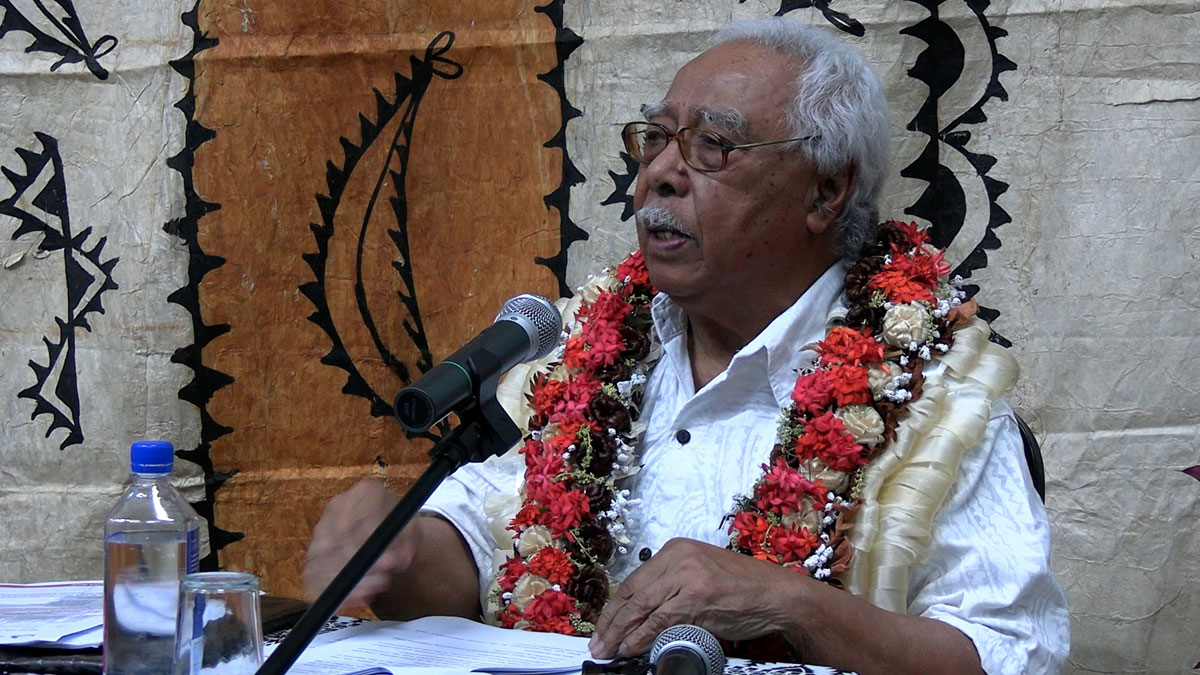
We will need to review the 2013 Constitution to ensure that no community is denied fair representation because we have seen the outcome of the 2022 general elections where certain minority communities have been denied representation in parliament.
This has been highlighted by former Permanent Secretary at the Prime Minister’s Office and University of Fiji’s Public Law and International Relations and Diplomacy lecturer, Jioji Kotobalavu while speaking during a symposium on Ratu Sir Lala Sukuna.
Kotobalavu says he believes that in any future review of the 2013 Constitution we should consider whether we should fundamentally change the system of electing representatives.
He says by doing away from the single constituency system, we do away with the evil 5 percent threshold which will be good for independent and small parties.
He believes that on that basis Ratu Sukuna’s 3-legged stool approach still has relevance in the sense that he looked at good governance and fair representation.
Kotobalavu says Ratu Sukuna’s belief was that those in charge of Fiji should always be conscious that the country was populated by the three main communities of Fijians, Europeans and Indians and the purpose of governing was to serve the best interests of all.
Kotobalavu further says with the progressive decline in the Indo-Fijian population, the numbers of the Indo-Fijian Members of Parliament will continue to decline.
He says in the 2022 elections under the 2013 Constitution, representation in the parliament by the ethnic minority communities of Rotumans, Europeans, Part Europeans, Chinese and others has been totally eliminated and the number of Indo-Fijian members has remained between 16 and 19.
Kotobalavu says the biggest gainers are the iTaukei as their numbers in the House of Representatives have increased from 34 in 2014 to 36 in 2022.
He says in the long term, this could lead to a system of government dominated by a single ethnic community so the question is that is it good for all of us.
Kotobalavu asks will the minority community who fail to secure representation still have confidence and security.
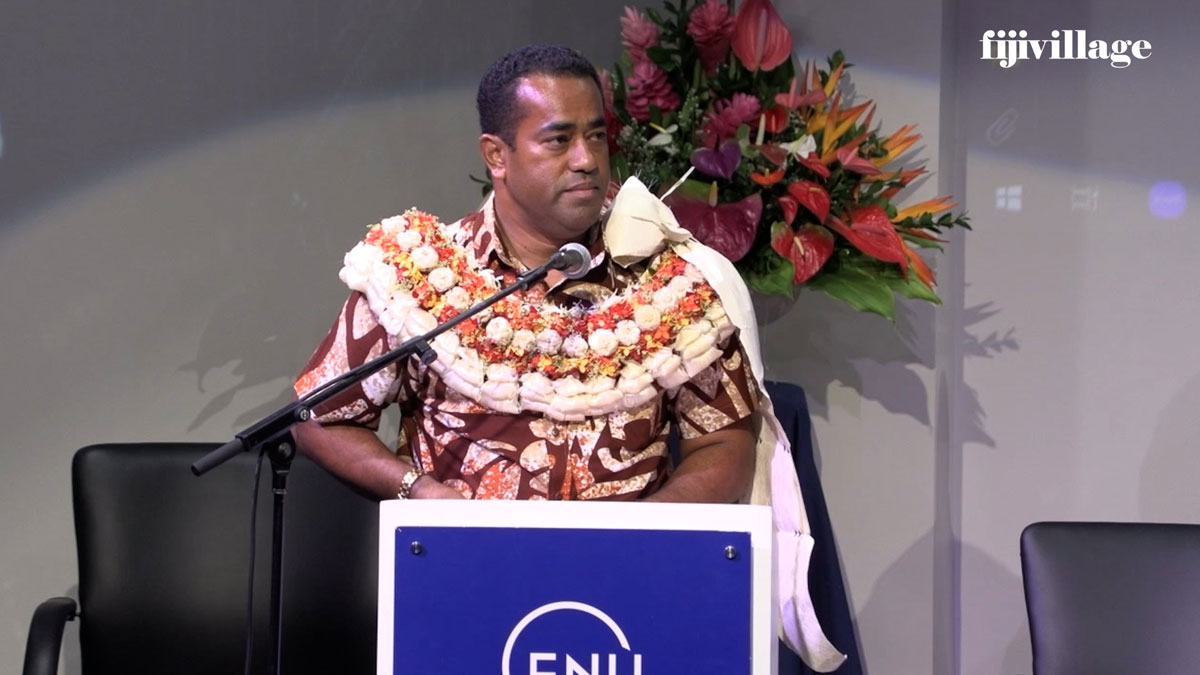
Some leaders are gifted and some who are gifted become leaders and Ratu Sukuna is a great example of this statement.
Minister for Lands and Mineral Resources, Filimoni Vosarogo highlighted this during the public lecture held at Fiji National University on the late Ratu Sir Lala Sukuna.
Vosarogo says the opening of the Great Council of Chiefs will allow the upcoming leaders to improve their leadership qualities.
He says Ratu Sukuna had a vision that he never gave up on like the way he fought for his country's administration.
Vosarogo says Ratu Sukuna single-handedly ensured that the leaders will have some inspiration from him and will continue to develop qualities of leadership for each generation.
Former Ambassador Emitai Boladuadua says Ratu Sir Lala Sukuna was the most educated and influential man in Fiji at the time, who played a crucial role in establishing the iTaukei Land Trust Board.
Boladuadua says he had set up a path for future chiefs and leaders to follow after his passing away on 29th May 1958.
Principal of Pacific Theological College, Reverend Professor Upolu Luka Va'ai says regional leadership is collapsing.
He says there is a need to improve regional leadership and we need to learn from Ratu Sukuna's leadership qualities.
Professor Va'ai adds Ratu Sukuna had compassion for the nation and its people, something the new leaders need to adapt.
He says having back-to-back celebrations like Girmit and Ratu Sukuna Day is not a coincidence but a well-thought plan by the government with the vision to reconcile the people and the Vanua.
Pro Vice-Chancellor Learning and Training Dr Jimaima Lako says Ratu Sukuna preserved his cultural upbringing even with the western education.
School of Education lecturer, Sereima Baleisomi says there is a deterioration of our cultural values which needs to be improved.
Baleisomi also acknowledged the role women play and specifically Adi Litiana Maopa, the mother of the late Ratu Sir Lala Sukuna, for playing a vital role in the upbringing of the children and their personal growth towards becoming a statesman.
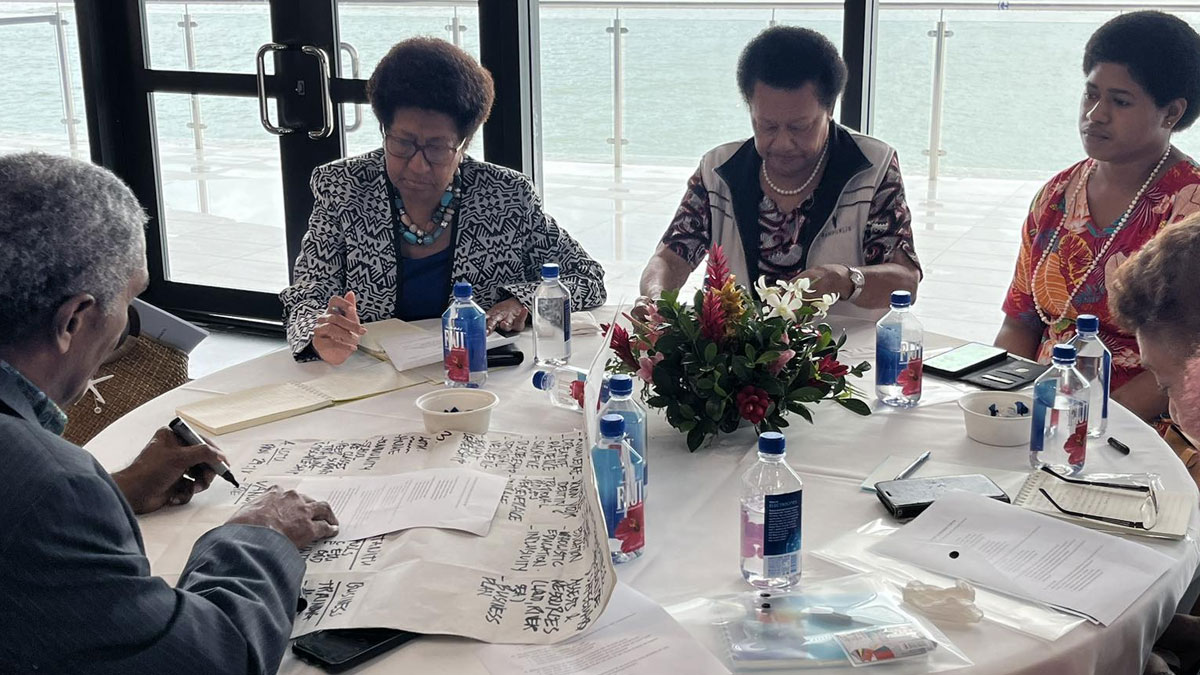
75 percent of the people living in poverty are the iTaukei and this presents a great challenge to our emerging leaders.
Na Marama Roko Tui Dreketi Ro Teimumu Kepa highlighted this during her opening speech during the Ratu Sukuna Day Celebration Leadership Conference that is underway at Harbour Point Convention Centre in Lami.
Ro Teimumu says while the poverty statistics are a cause for concern, the main suggestion that presents to us all is to educate our leaders because leadership is about service to others.
She says leadership is about service to your neighbours and not about being served.
Ro Teimumu also says if a leadership type would have been applied to the late Ratu Sir Lala Sukuna, it will be the visionary leadership.
The Leadership Conference continues in Lami.
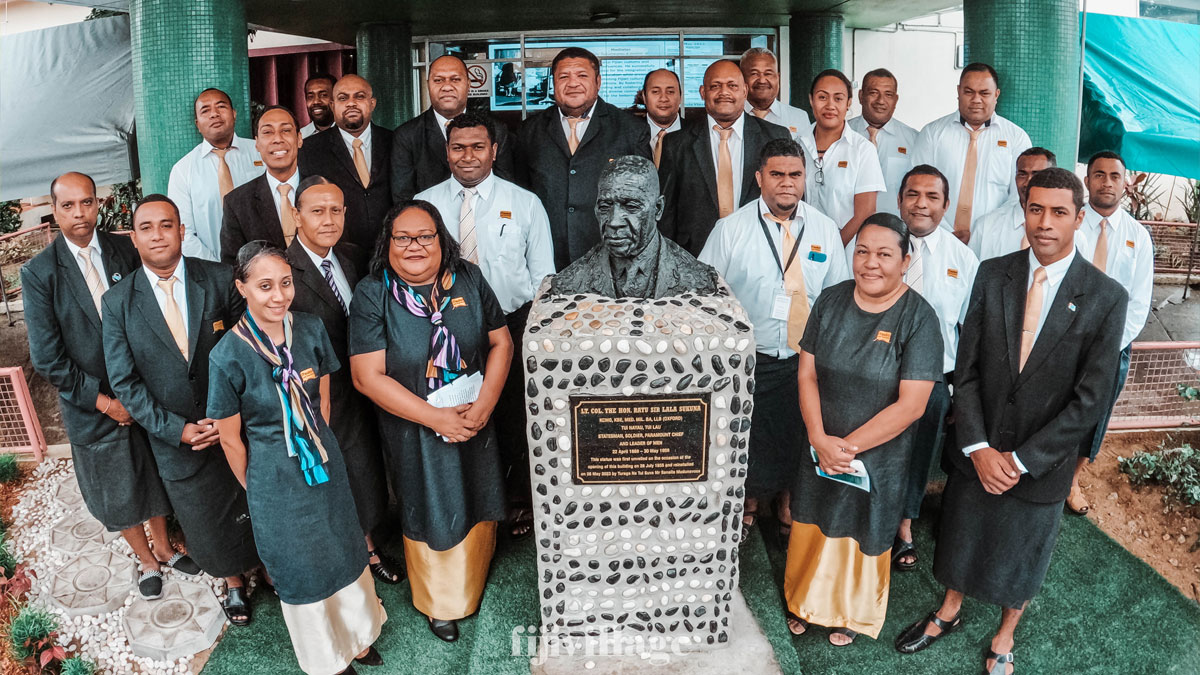
It is a historic moment for the iTaukei Land Trust Board as they unveiled the Ratu Sukuna Monument today.
Manager Strategic Planning Change Management Innovation, Reijeli Taylor says the unveiling of the monument marks a very significant event because over the past 16 years, they were not able to come out and celebrate the life of Ratu Sir Josefa Lalabalavu Sukuna because of what the previous government had initially mentioned.
Taylor says every year they have internal celebrations to remind them about Ratu Sukuna as he played a very important part in Fiji’s development and he was also the founder of the TLTB.
She says the monument of Ratu Sukuna was removed by the previous government.
She says TLTB has served the nation for 83 years.
Turaga na Tui Suva Ratu Sanaila Mudunavosa encouraged the staff of TLTB to continue to serve the nation to build a better Fiji.
Ratu Sanaila unveiled the monument of Ratu Sukuna.
Ratu Sanaila unveiled the monument of Ratu Sukuna.
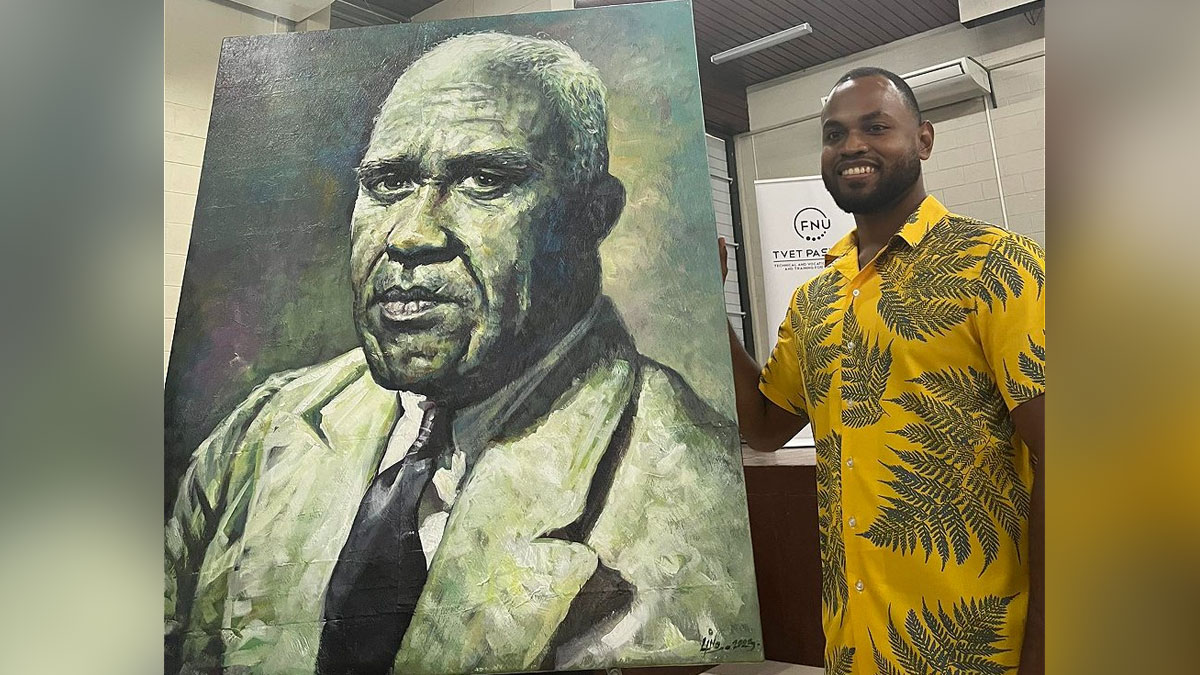
There is a video currently going viral on social media of an artist painting a portrait of Ratu Sir Lala Sukuna.
The person behind it is Tough Arts Fiji artist, Lino Lionel Colaitiniyara of Bagasau, Cakaudrove who lives by the motto talents used is talents multiplied.
Colaitiniyara revealed to fijivillage News that he was commissioned to do that painting, and it took him two days to complete.
He says art has always been a part of his life and at his lowest point, while scrolling through social media in a sugar cane field he saw news of his friends graduating, getting jobs, and started thinking about his own future.
The Tough Arts artist says he sought divine intervention on how to make use of his talent which is the only thing that he has.
He also says his prayers were answered a few months later and he started doing free portraits, the first of which was for a friend who then encouraged him to create a Facebook account to showcase his art.
Colaitiniyara further says he started off with $5 portraits and then as the demand grew the price went up to $10, $20, $30, $50 and then in 2019 he bumped it all the way up to $100.
His page went viral after being invited to exhibit a few pieces at the Alliance Française.
He adds that he utilises Facebook and TikTok to advertise his work and his engagement has grown over the last few years through this.
Colaitiniyara adds his family supported his dreams, and while they might not have had the resources, they always pushed him forward and encouraged him with prayers.
He says his wife is the mainstay of his business and he wants to provide everything for her and his 11-month-old son.
He is not only looking to the future but also wants to help those who will be the future, as he plans on holding art classes for primary students, high school and then later adults from this year.
Colaitiniyara’s advice to young people is to stop wasting time.
If you want to get a commissioned piece from him, you will have to wait, as he is totally booked till November.
You can check out his video below.
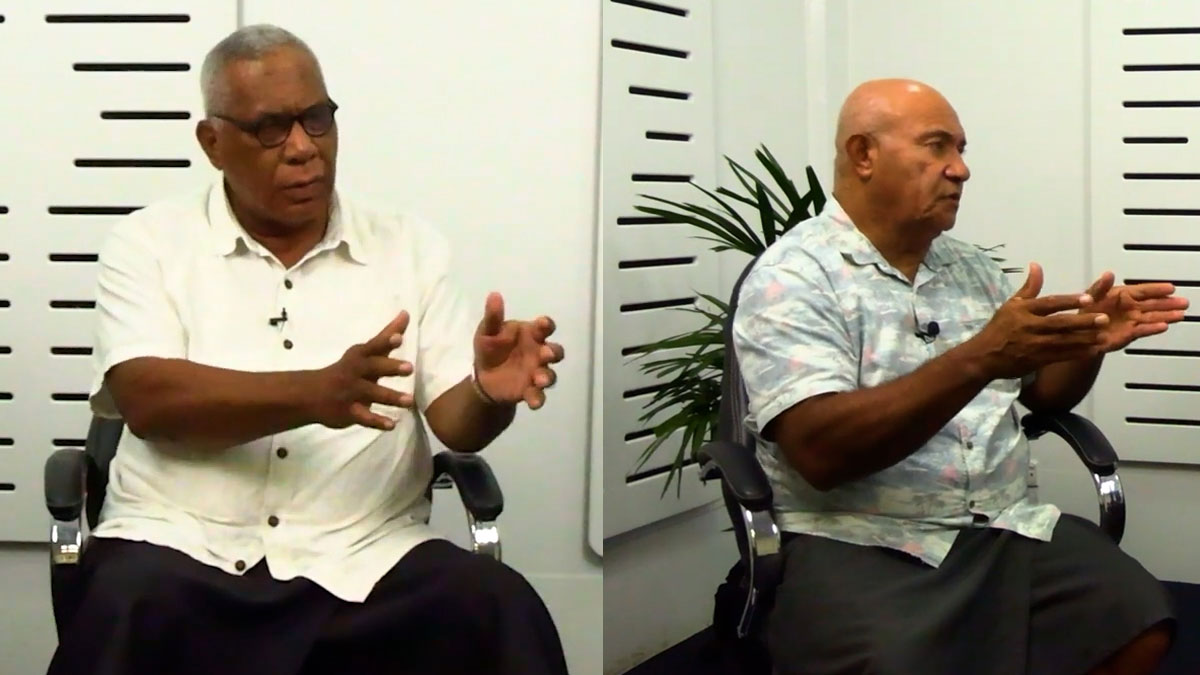
The Chair of the Great Council of Chiefs Review Team, Doctor Jone Baledrokadroka says they will have to make some hard decisions after gathering all the submissions on how a revamped GCC should look like and to ensure that it is inclusive.
Doctor Baledrokadroka says on one side of the spectrum, the traditionalists would like to see the GCC to be exclusive and just to have chiefs while the modernists or liberals want a change with diverse views and have a vast array of people reflected in the society today.
The Turaga Roko Tui Bau and review team member, Ratu Timoci Tavanavanua says they have to ensure that the GCC is not just exclusive to the iTaukei.
Ratu Timoci says they have spoken to the district advisory groups and the general consensus was that they want it to be re-established as they say they would feel secure with the GCC bringing people together.
Baledrokadroka says the question remains on whether we can politics proof the GCC as it is very hard to do that.
While reacting to previous statements that the GCC was a British set up, he says in every society, Baledrokadroka says there is an infusion of various traditions and culture.
He says no society stands alone in a vacuum.
Baledrokadroka says after the coming of the British, the iTaukei have assimilated a lot of that culture and tradition, and we have made it our own.
He says the GCC is an introduced institution but over the years the iTaukei have made that part and parcel of our culture and tradition to look up to the GCC as the head of the society.
Baledrokadroka says this is a strong group think in the iTaukei community.
Ratu Timoci Tavanavanua also says the main reason for calling the meeting is that it has been 16 years since the GCC has been disestablished.
He says this meeting is to lay the platform to begin the relationship between the chiefs of all provinces going forward.
Ratu Timoci says they will also focus on what changes can be brought about to bring changes to the lives of the iTaukei and other races.
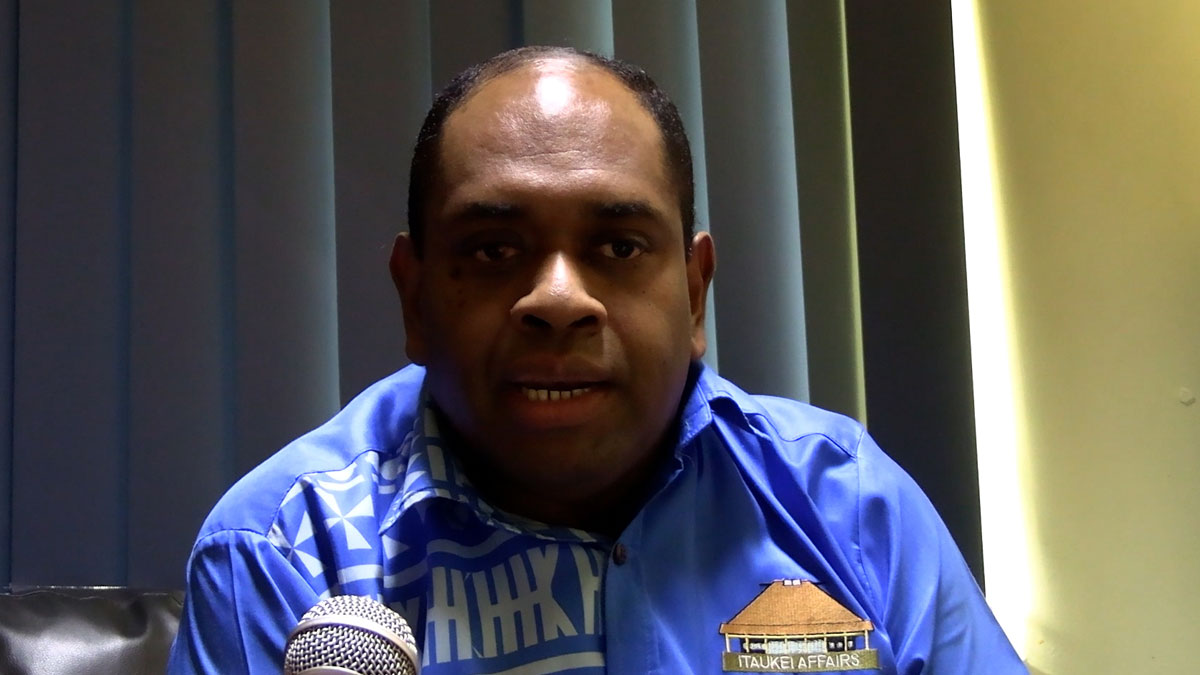
In the past few decades, the iTaukei unknowingly and unwillingly have lost part of their identity — their traditional games.
Deputy CEO of the iTaukei Affairs Board, Josefa Toganivalu says it is rather unfortunate that most of these games are no longer played because of the impact of westernization and modernization.
Toganivalu says a few games that will be showcased on Saturday are the Fijian Javelin(Veitiqa), Fijian Tag (Qito Buka), Tug of War(Veidre dali), Veicibi, Veiceu etc.
He urges everyone to visit the Traditional Game site on Saturday and participate as well at the Ratu Sukuna Memorial School grounds as part of the Ratu Sukuna Week celebrations.
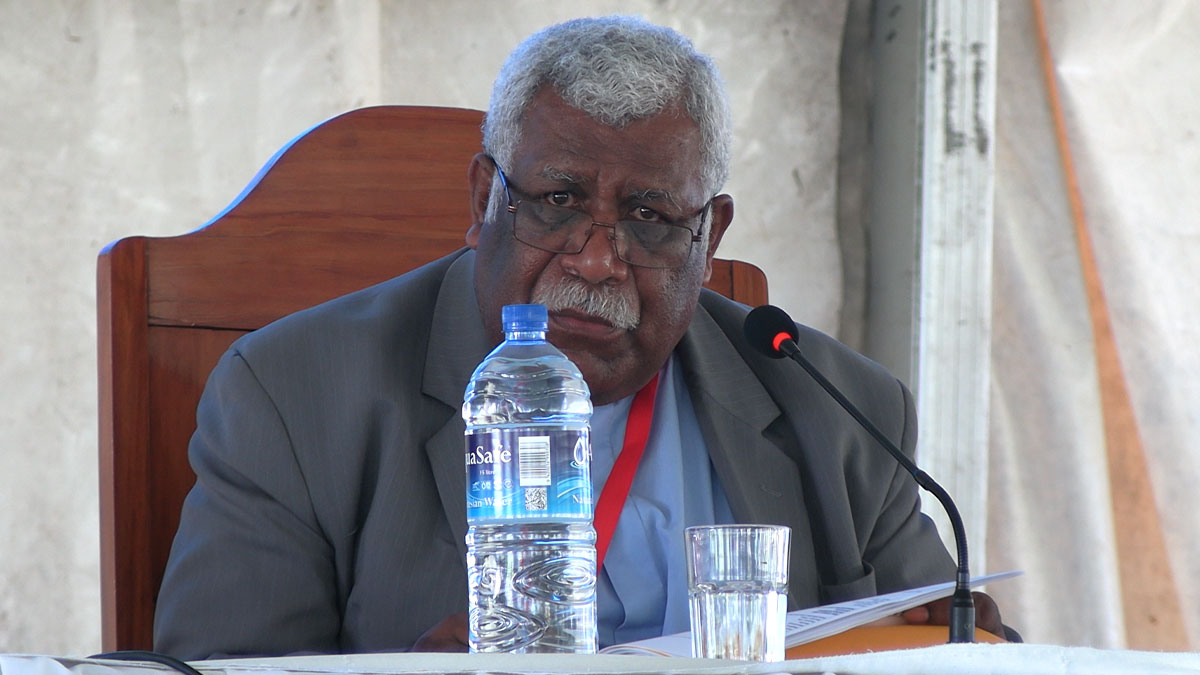
Methodist Church of Fiji President, Reverend Ili Vunisuwai has called on the members of the Great Council of Chiefs to ensure that the new GCC will do the things that is intended to benefit the people.
He says the members should not forget why they are part of the council as they are there to represent their people.
Reverend Vunisuwai also highlighted that he was so emotional to be invited by the leaders of the religious bodies from the Hindu and Muslim faith, where they acknowledged what the Methodist Church in Fiji did in organising the reconciliation service.
He says this is a new dawn for Fiji.
Meanwhile, thousands have turned up to Bau to witness the return of the Great Council of Chiefs meeting after the indigenous body was disbanded in 2007.
Members of the government and foreign delegates are on the island to be part of this occasion.
GCC Chair and Minister for i-Taukei Affairs, Ifereimi Vasu escorted President Ratu Wiliame Katonivere to the meeting hall.
Prime Minister Sitiveni Rabuka, Deputy Prime Minister Manoa Kamikamica, Deputy Prime Minister Professor Biman Prasad, Deputy Prime Minister Viliame Gavoka, Attorney General Siromi Turaga, Minister for Home Affairs and Immigration Pio Tikoduadua, New Zealand High Commission Charlotte Darlow, members of Cabinet, political party representatives, foreign delegates and the diplomatic corps are at the opening ceremony.
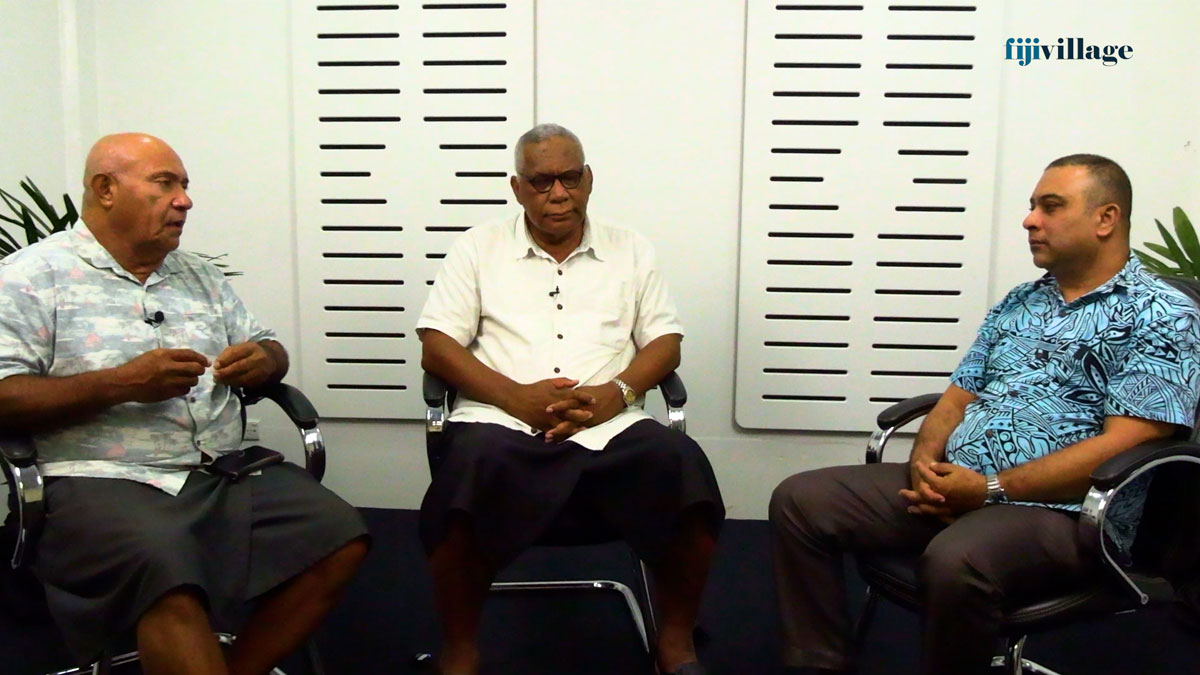
The latest Fiji Bureau of Statistics report which highlighted that 75 percent of the iTaukei live in poverty is expected to feature prominently in the Great Council of Chiefs meeting starting today
Turaga Roko Tui Bau and member of the GCC Review Team, Ratu Timoci Tavanavanua says this is a contentious issue, and the GCC has to take the lead to ensure that the lives of the iTaukei community improve for the better along with other races.
Chair of the GCC Review Team and former senior military officer, Doctor Jone Baledrokadroka says the iTaukei have regressed in the society over the past few decades.
He says people just have to look around us in all the towns and cities - the lack of iTaukei empowerment in business.
Baledrokadroka says you can see the disparity of the iTaukei in all aspects of commercial life, he asks why is it that the iTaukei are so slow.
When asked on the issue that people may see this as a ethno-nationalist agenda, Baledrokadroka says identity politics is here to stay and we now have the United Nations Declaration of Indigenous Rights.
He says countries like New Zealand, Australia, Canada and the US have all ratified the declaration.
Baledrokadroka says with transparency and good governance issue, you can marry the two, and it is well understood that we have to be inclusive.
Baledrokadroka’s review team has completed consultations in 9 provinces including district advisory councillors, the USP and FNU.
He says 40 consultations have been formally done while they are targeting 100 consultations including the Fijian diaspora overseas on a revamped GCC.
Baledroadroka says a lot of work is needed with such an important institution as the GCC, and there has been a lot of controversy in the past with the GCC meddling in politics.
He says in the past, there was a perception that the GCC was heavily politicised, and they have to get to the bottom of the issue on whether this was a group think of the former government.
Baledrokadroka says some are saying they want their chiefs to be customary chiefs and there are suggestions that the GCC should be apolitical but it is hard to achieve this.
Ratu Timoci Tavanavanua says the general crux of it all is to establish an institution that will form a pathway to bring socio-economic development and improvement to the lives of the iTaukei and it is also important that the institution is robust and will be able to withstand the test of time especially with climate change, the global economic downturn and things like COVID-19.
He says it should also produce improvements and lift the lives of not only the iTaukei but the general populace.
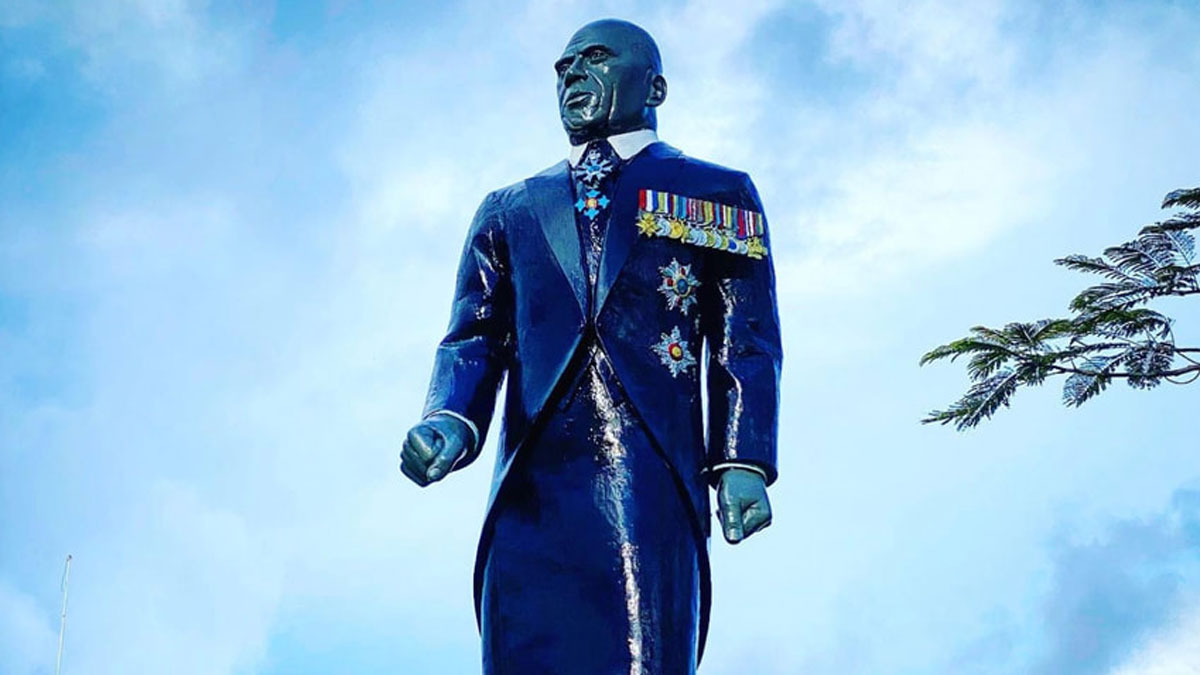
As the country heads into an important week to celebrate the achievements and contribution of one of Fiji’s greatest statesmen, Ratu Sir Josefa Lalabalavu Vanayaliyali Sukuna, the iTaukei Affairs Ministry says we are reminded of the words of the late Chief of Naisogolaca Ratu Sir Etuate Cakobau in 1995; where he said that if we want to remember the life of Ratu Sukuna, he was a man that brought together all different races in unity.
According to the iTaukei Affairs Ministry, it has been 65 years since the death of Ratu Sir Lala Sukuna, and he has done his responsibility by lifting the iTaukei people and chiefs into leadership roles.
The Ministry says through Ratu Sukuna’s visionary leadership, iTaukei leaders were educated, so they can take over the leadership when elders pass on.
It says the fruition of his work and achievements has also laid the foundation for moving the iTaukei community from where they were before independence to what can be seen now.
After more than a decade, Fiji will again celebrate the legacy of Ratu Sir Lala Sukuna.
The celebration will kick start immediately after the opening of the Great Council of Chiefs meeting on Bau Island on Wednesday.
The Ratu Sukuna Week celebration will be a 6-day event, starting from Wednesday.
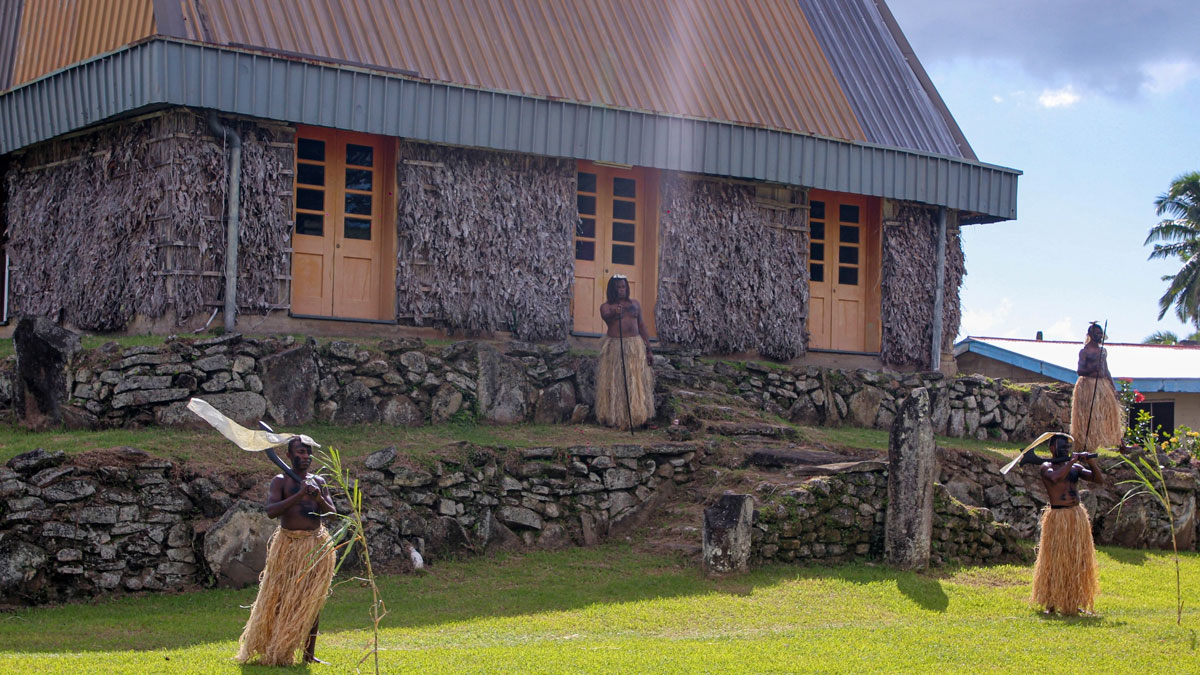
Minister for iTaukei Affairs Ifereimi Vasu will chair the Great Council of Chiefs meeting on Wednesday after the opening by President, Ratu Wiliame Katonivere on Bau Island.
Vasu says cabinet has approved the iTaukei Affairs Great Council of Chiefs Regulations 2023 and this regulation is only for the meeting on Bau Island as it gives the meeting a legal basis.
The regulation released four categories of membership.
There are 3 ex-officio members, and they are the President of Fiji Ratu Wiliame Katonivere, Prime Minister Sitiveni Rabuka and Minister for i-Taukei Affairs Ifereimi Vasu.
According to the regulation, the Minister may invite six members.
Vasu has chosen Ratu Epenisa Cakobau, Ro Teimumu Kepa, Ratu Naiqama Lalabalavu, Ratu Ilisoni Qio Ravoka, Ratu Vuniani Navuniuci and Ratu Penioni Nacagilevu.
The Provincial Council may invite 3 chiefs from each province and three members of the Council of Rotuma representing the chiefs of Rotuma.
Vasu says he has received the nominations from the 13 provincial councils and 3 from Rotuma.
The representatives from Ba are Ratu Eparama Kitione, Ratu Filimoni Lagivala Nale and Ratu Manasa Naikasowalu, representatives from Bua are Ratu Ramakutu Nagagavoka, Ratu Semi Ramatai and Ratu Isoa Uluiqalala, the Cakaudrove representatives are Ratu Jone Golea Lalabalavu, Ratu Sakiusa Vakalolo and Ratu Kalivati Vakalalabure, the Kadavu representatives are Ratu Jona Navakalukalu, Ratu Tevita Waqanivavalagi and Ratu Apakuki Nanovo, the Lau representatives are Ratu Tevita Uluilakeba, Roko Josefa Cinavilakeba and Ratu Enele Colavanua, Lomaiviti has Ratu Etueni Caucau, Jone Davila and Ratu Sevanaia Lewanavanua, the Macuata representatives are Ratu Maika Rokobatidua, Ratu Tevita Niumataiwalu and Ratu Ilisaniti Malodali, Nadroga/Navosa has Ratu Emosi Buruayatu, Ratu Kini Vosailagi and Ratu Marika Bulikula, the Naitasiri representatives are Ratu Jese Ranatuniyono, Ratu Kalokalo Loki and Ratu Aca Romolitabua, the representatives from Ra are Ratu Moape Niudamu, Akuila Kubou and Manoa Seru, Rewa has Ro Naulu Mataitini, Ratu Ilisoni Vuidreketi and Ratu Acu Vulaidausiga, Serua has Ratu Sela Waiwaidilo, Ratu Emosi Navunisaravi and Ratu Apenisa Maiyale Dovarua, the Tailevu representatives are Ratu Isoa Gavidi, Ratu Ilaitia Dreuvuata and Semi Matalau and the Rotuma representatives are Gagaj Manav Kauata Pat Samuela, Gagaj Maraf Rupeti Ematai Mani and Gagaj Tuiporotu Raymond Savea.
The Minister for iTaukei Affairs, says as widely reported, Namosi will not be represented.
The Ratu Sukuna Week celebrations will commence immediately after the opening of the GCC on Bau Island.
Meanwhile the team undertaking the review of the GCC will also be making a presentation with recommendations after having consultations in 9 provinces. The review team is expected to continue consultations in the remaining provinces after this GCC meeting.
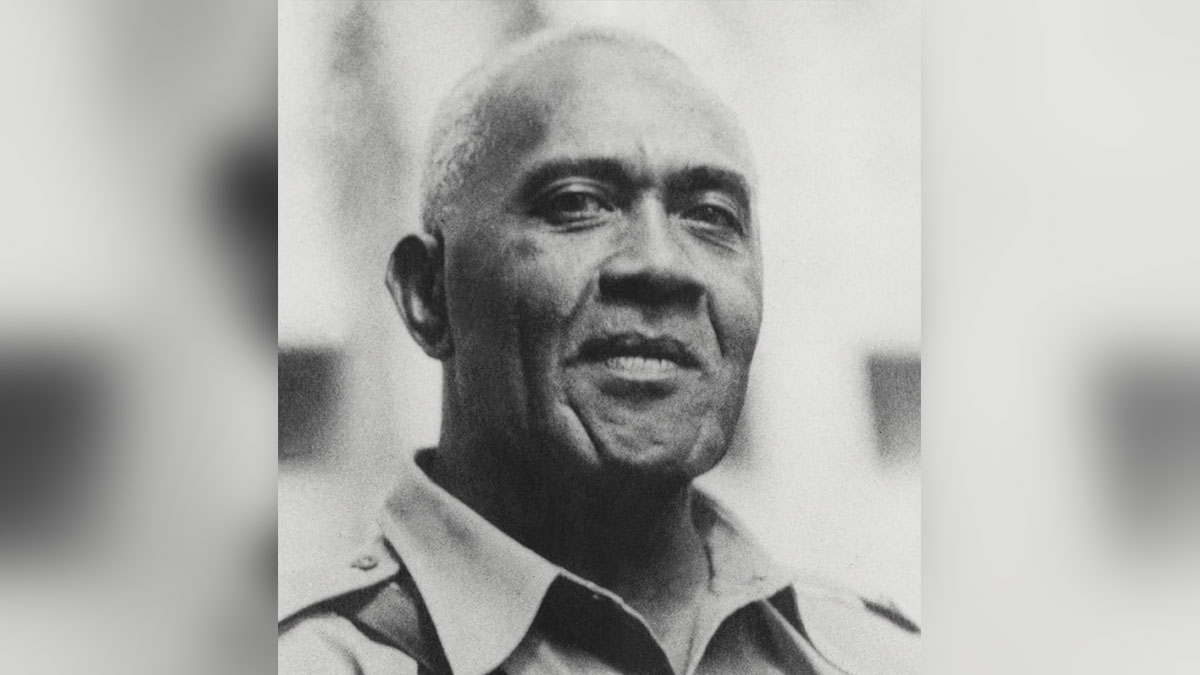
The Ratu Sukuna Day celebration will be held over a 6 day period from Wednesday to Monday 29th May 2023, with the theme visionary leadership, based on Ratu Sukuna's legacy.
The celebration will commence immediately after the opening of the Great Council of Chiefs meeting held on Bau Island.
Minister for iTaukei Affairs, Ifereimi Vasu says two celebrations will be held on Wednesday, with one held at the Fiji Museum and another held at Ratu Sukuna Memorial School.
Vasu says three public lectures will be held during the celebration and all the Ratu Sukuna displays will be at the museum with no entry fee.
He says there will be 3 public lectures of Ratu Sukuna, one is held at 5pm Wednesday by Professor Steven Ratuva at USP while one is to be delivered by Ambassador Emitai Boladuadua at FNU at 5pm Thursday.
He adds that at 5pm Thursday, the University of Fiji will organise a symposium at its Samabula campus with a keynote address delivered by former Permanent Secretary, Jioji Kotobalavu.
Ifereimi Vasu says on Friday, there will be a Ratu Sukuna leadership conference at the Harbour Point Convention Centre.
He says there will be traditional iTaukei games that will be held at the Ratu Sukuna Memorial School Ground.
Vasu says the Fiji National Rugby League Sukuna around will be held on Saturday at Bidesi Park, with teams competing for the Sukuna Shield.
He further says a church service will be held on Sunday at the Vodafone Arena at 4pm with members of the public invited to attend.
The main celebration will be held on Monday the 29th with a march to be held from the Suva Flea Market to Albert Park with the President delivering his speech followed by entertainment and an evening reception at the State House that will conclude the celebration.
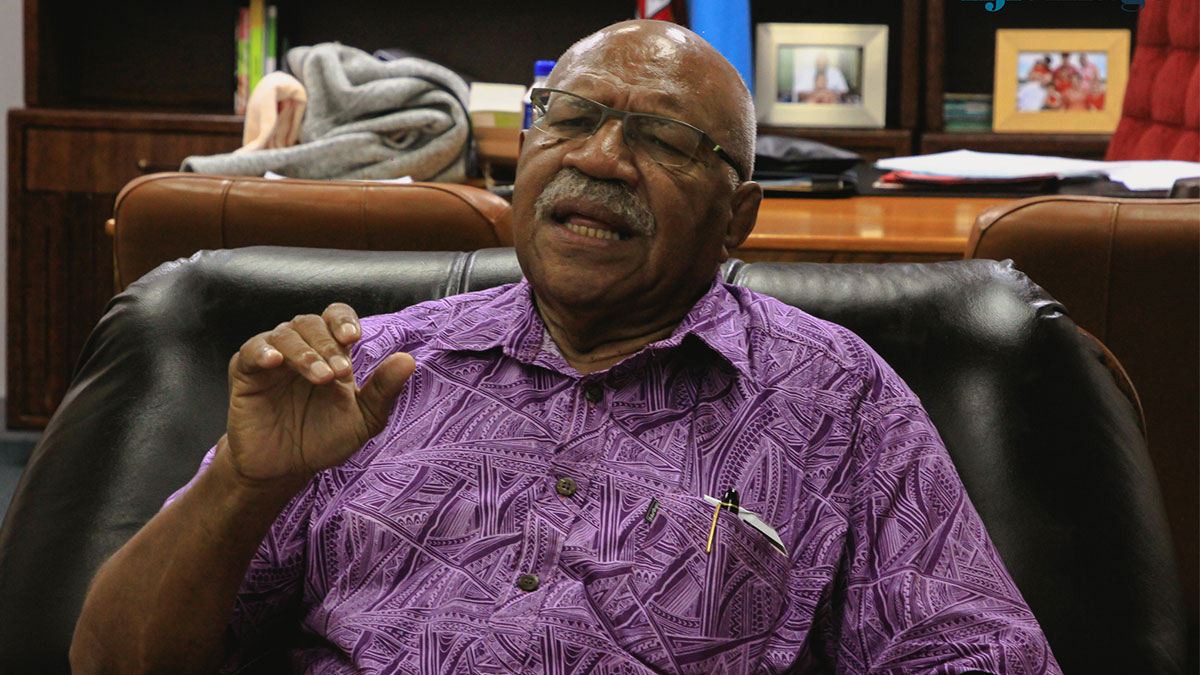
Prime Minister Sitiveni Rabuka has clarified that the funds that will be used for the Girmit and Ratu Sukuna Day celebrations is a one time thing and it will be different next year.
While speaking during the fijivillage Straight Talk with Vijay Narayan, Rabuka says this is a one time expenditure.
He says the celebration can also be funded from the existing budget or savings from other areas.
The Prime Minister adds that this year will be the first time to celebrate both holidays as it will bring unity and also educate the younger generation on the great contribution our forefathers have made for the nation.
It has been confirmed that $500,000 each will be used for the Girmit and Ratu Sukuna Day celebration.
Girmit Day will be celebrated on the 15th of this month while Ratu Sukuna Day will be celebrated on the 29th.

Cabinet has approved the inclusion of Ratu Sir Lala Sukuna Day and Girmit Day in the revised 2023 Public Holiday dates and removed Constitution Day as a public holiday.
Ratu Sir Lala Sukuna Day will be celebrated on the last Monday of the month of May, which is May 29th this year.
Girmit Day will be celebrated on Monday 15th May, 2023.
Cabinet also agreed that the two new public holidays will be recognised through appropriate celebrations.
Two National Committees will be established to oversee the celebrations for the two holidays.
The National Committee for the Girmit Day celebrations will be chaired by the Deputy Prime Minister and Minister for Finance, and the National Committee for the Ratu Sukuna Day celebrations will be chaired by the Minister for iTaukei Affairs.
Further announcements on the celebrations will be made as the Committees commence their work.
The revised public holiday dates will be published in the Gazette by the Minister for Employment, Productivity and Industrial Relations, Agni Deo Singh.
There will now be 11 public holidays in 2023.
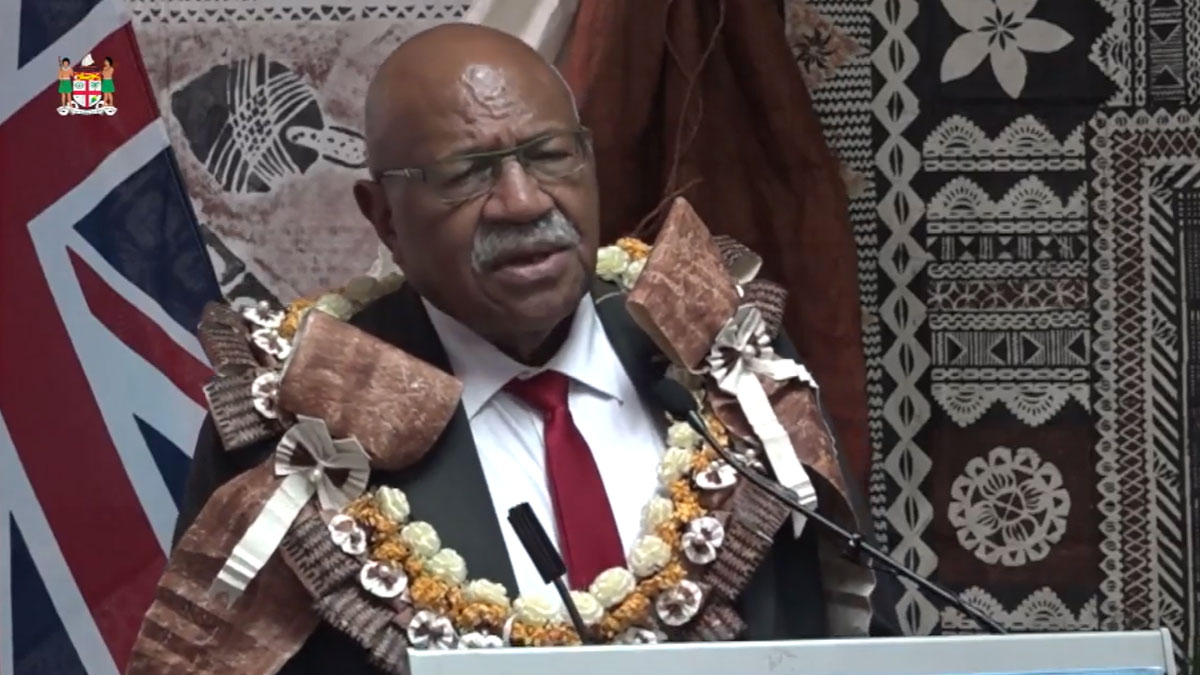
Girmit Day and Ratu Sukuna Day will be official public holidays in 2023.
While speaking during his inaugural address to the nation, Prime Minister Sitiveni Rabuka says some months ago, he pledged to legislate for a Girmit Day public holiday to honour the settlers from India who began arriving here in 1879.
He says they were starting a new life in an unknown land and stayed to become an integral part of our country.
Rabuka says he reconfirms his promise to inaugurate the new national holiday in 2023.
He adds for reasons that are unclear, the former government decided to scrap the national holiday marking the life and achievements of our great chief and statesman, Ratu Sir Lala Sukuna.
The Prime Minister says they will reinstate Ratu Sukuna Day.
He says the monumental work of this illustrious traditional leader on land reform has had a continuing beneficial effect on the landowners, the economy, the sugar industry, business and investment.
Stay tuned for the latest news on our radio stations

